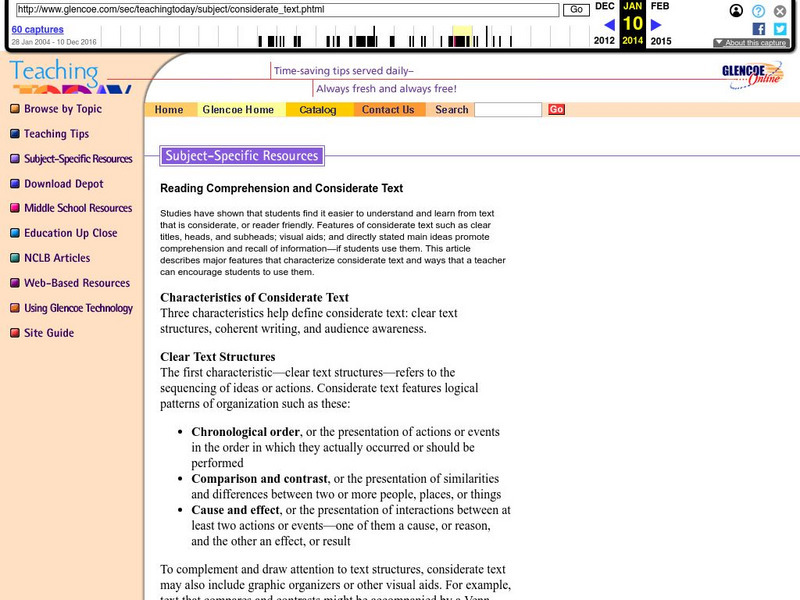ReadWriteThink
Read Write Think: Nonfiction Pyramid
A printable pyramid for use with nonfiction texts while students identify the main ideas and supporting details within a text. Students also determine author's purpose and key vocabulary words. Directions on how to use this type of...
ReadWriteThink
Read Write Think: Using Narrative for Expository Text
Lesson in which students read various narrative texts which provide a context for them to learn content-area topics. Narratives allow the students to begin to understand expository texts.
ReadWriteThink
Read Write Think: Research Building Blocks: Skim, Scan, and Scroll
Contains plans for two lessons on locating supporting details that are part of a larger unit on researching a state symbol. It works on skills like determining the most important information, using key words to identify relevant...
ReadWriteThink
Read Write Think: Guided Comprehension: Making Connections
Lesson introduces young scholars to the strategy of making connections. Students learn the three types of connections using a double-entry journal. A good resource for teachers.
ReadWriteThink
Read Write Think: Exploring How Section Headings Support Understanding
Teaching students to pay attention to headings and titles as they read? Here you'll find a practical application for using an expository text to apply the concept of using headings. Geared toward older elementary students, but lesson...
ReadWriteThink
Read Write Think: Guided Comprehension: Semantic Analysis
Lesson introduces learners to comprehension of knowing how words work. Students learn semantic feature analysis and examine folktales, myths, and fables using this analysis to better understand these terms and texts.
ReadWriteThink
Read Write Think: Writing Abc Books to Enhance Reading Comprehension
Contains plans for four lessons that are adaptable to many texts that young scholars may be reading. Students analyze the text for literary elements such as characters, setting, figures of speech, and themes, and then publish their...
Other
Reading Quest: Strategies for Reading Comprehension: Power Thinking
Looking for an alternative to formal outline instruction? Power Thinking teaches the concept of outlining but on a somewhat simplified level. The site is good for basic note-taking from a text.
Curated OER
Mc Graw Hill: Part 2 Reading: Comparison and Contrast Text Structure
A reference article showing reading strategies to understand text structure of comparison and contrast.
Polk Brothers Foundation Center for Urban Education at DePaul University
De Paul University: Center for Urban Education: Prairie Keepers [Pdf]
"Prairie Keepers" is a one-page, nonfiction passage about how the prairie was saved from total destruction and the efforts of the Department of Agriculture to rebuild the prairie. It is followed by questions which require students to...
Education Development Center
Tv411: Summarizing Activity 2
This activity asks students to differentiate between main ideas and supporting details.
Curated OER
Mc Graw Hill: Part 2 Reading: Informational Text: How Reasons Support Key Points
Get an example of how to identify an author's main idea in a text on this site. Also, learn how to recognize supporting ideas to main ideas presented in a text. CCSS.ELA-Literacy.CCRA.R.2
SMART Technologies
Smart: Main Idea & Details
This interactive lesson offers clarification and practice in the realm of main ideas and details.
Education Development Center
Tune in to Learning: Summarizing
Series of interactive activities for practicing skills in summarizing information, in identifying main points and ideas, and in sorting lists into meaningful categories.
ReadWriteThink
Read Write Think: Guided Comprehension: Summarizing
Lesson that introduces students to the comprehension technique of summarizing. Students learn using the QuIP (questions into paragraphs) method which involves organizing information and putting it in writing.
US Department of Education
U.s. Dept. Of Education: Teaching Approaches: Text Comprehension Instruction
What is text comprehension? How does comprehension improve our reading ability? Check out this site to learn more about reading comprehension instruction. There are some wonderful suggestions for teachers to implement in their classrooms.
Tom Richey
Slide Share: Main Idea and Supporting Details
A slide show with seventeen slides teaching about main ideas and supporting details within a text.
Read Works
Read Works: The Scientific Method
[Free Registration/Login Required] An informational text explaining the five steps of the scientific method. A question sheet is available to help students build skills in reading comprehension.
Read Works
Read Works: Main Idea 3rd Grade Unit
[Free Registration/Login Required] A three-lesson unit teaching students to use the first and last sentence to identify the main idea of a paragraph and the first and last sentence in each paragraph to identify the main idea of a...
Read Works
Read Works: Main Idea 4th Grade Unit
[Free Registration/Login Required] A two-lesson unit on main idea and details through which young scholars use the topic sentence to identify the main idea of a paragraph and categorize details as main idea or supporting. With free...
Curated OER
Mc Graw Hill: Part 2 Reading: Informational Text: Reasons and Evidence in Text
An article discussing how authors use reasons and evidence to support their ideas in a text. Site includes an example to help students find reasons and evidence.
Scholastic
Scholastic: Informational Text: Reading Response: Main Ideas & Details [Pdf]
This graphic organizer can be used with students when they read informational text. Students will write the main idea in a central oval and then write four details that support the main idea of this reproducible graphic organizer.
Curated OER
Glenco Online: Teaching Today: Reading Comprehension and Considerate Text
Learn the features of "considerate text" and ways to teach students to use these features to increase their comprehension as they read. These features generally apply to non-fiction, especially textbooks.







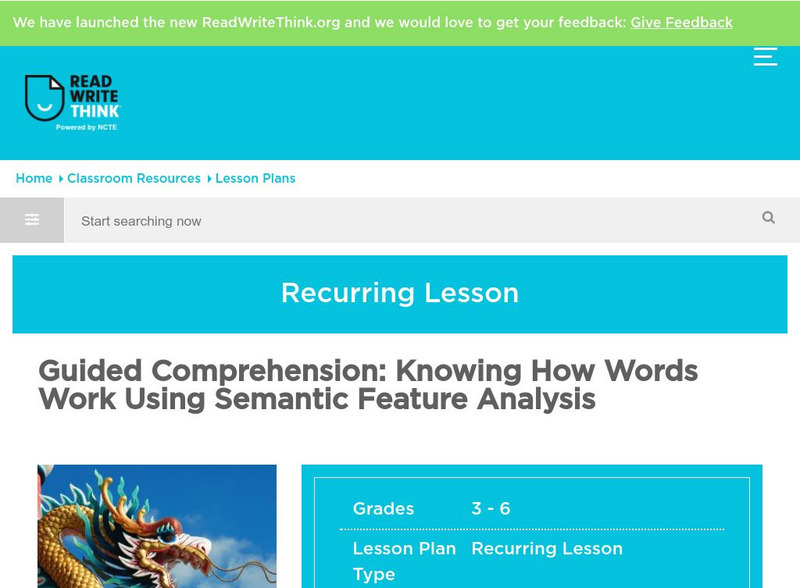



![De Paul University: Center for Urban Education: Prairie Keepers [Pdf] Unknown Type De Paul University: Center for Urban Education: Prairie Keepers [Pdf] Unknown Type](https://d15y2dacu3jp90.cloudfront.net/images/attachment_defaults/resource/large/FPO-knovation.png)
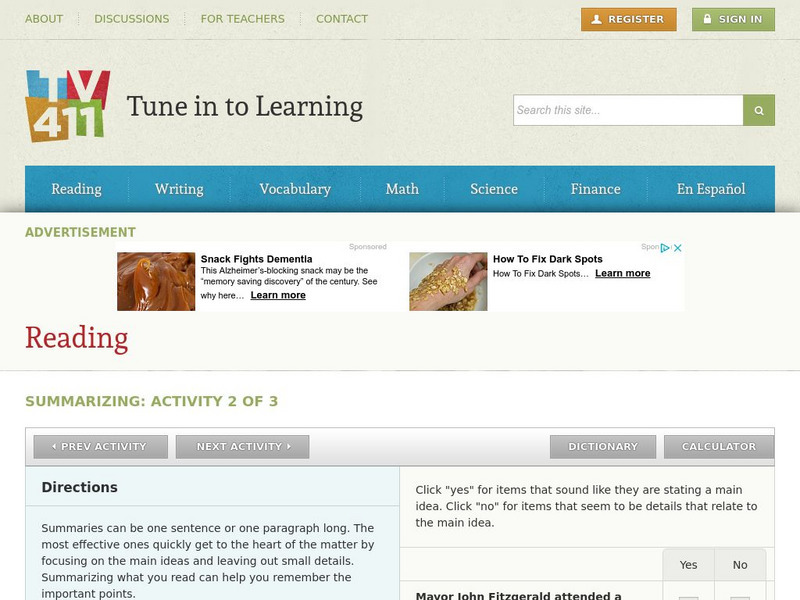





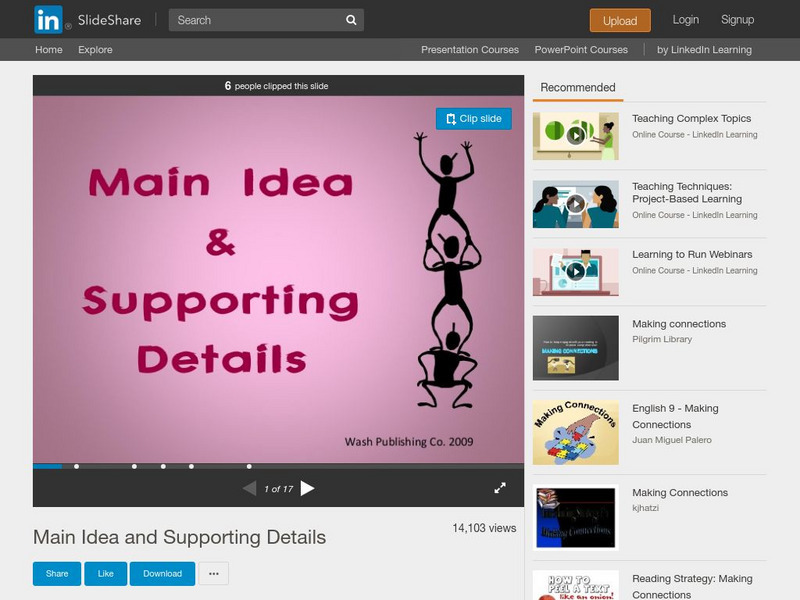
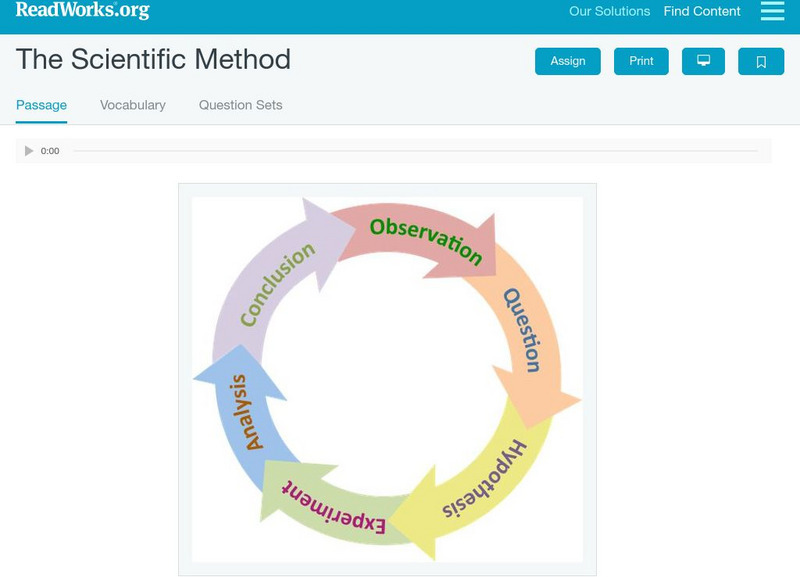



![Scholastic: Informational Text: Reading Response: Main Ideas & Details [Pdf] Graphic Scholastic: Informational Text: Reading Response: Main Ideas & Details [Pdf] Graphic](https://content.lessonplanet.com/knovation/original/241272-21ebac911f8734b3826318f202df38b5.jpg?1661510811)
